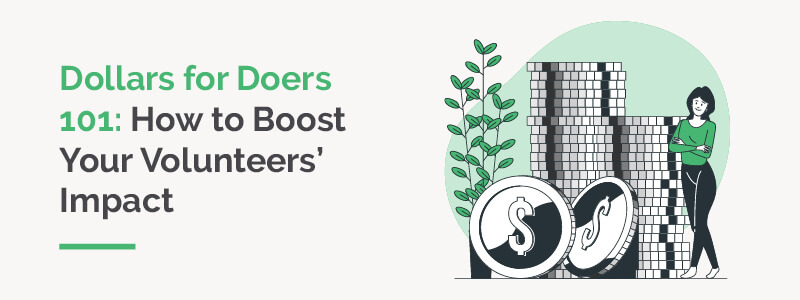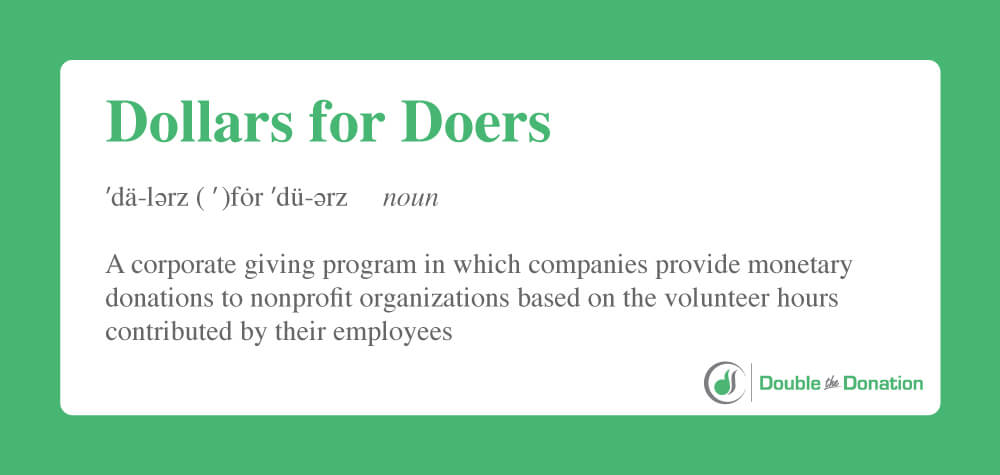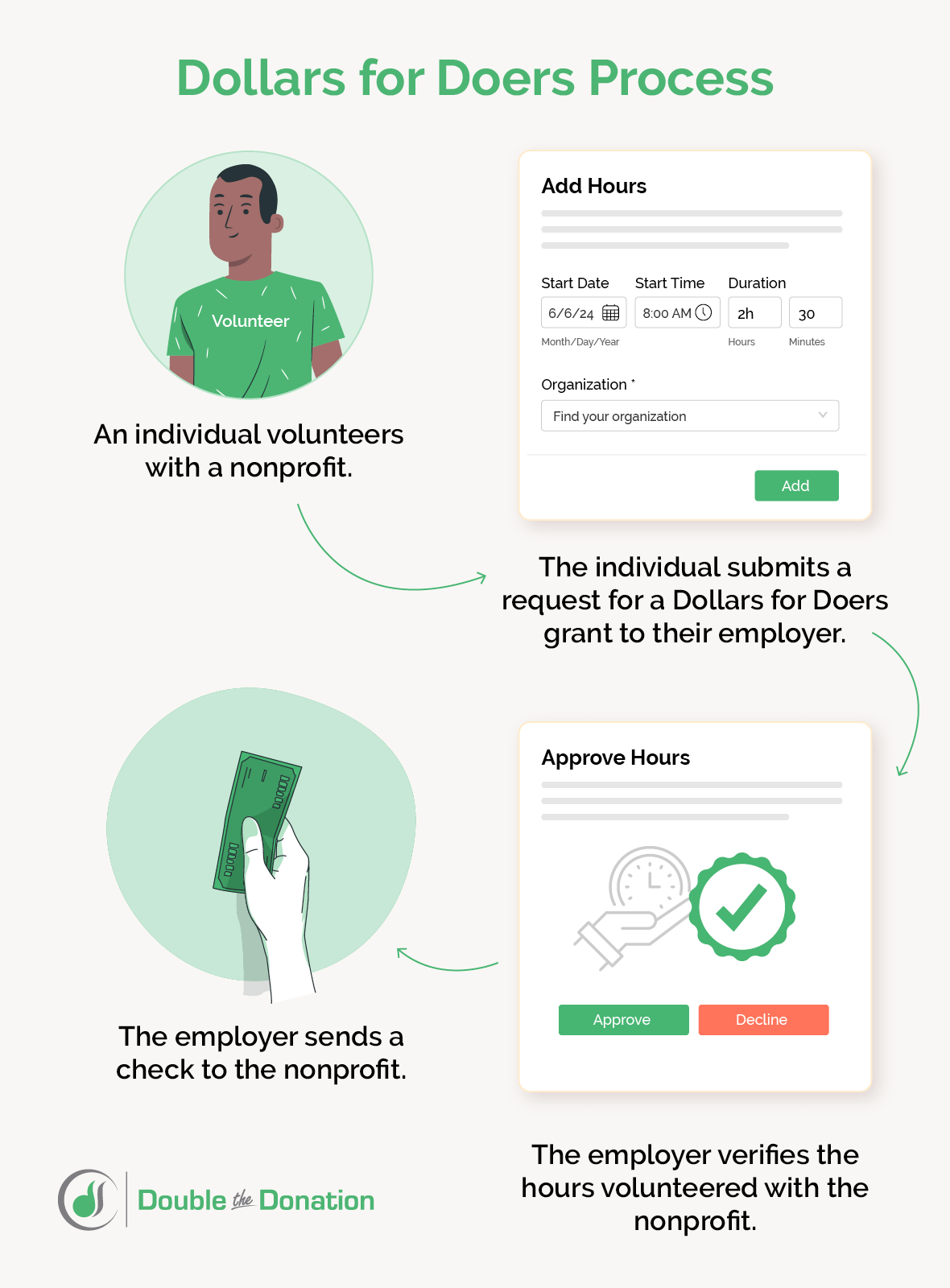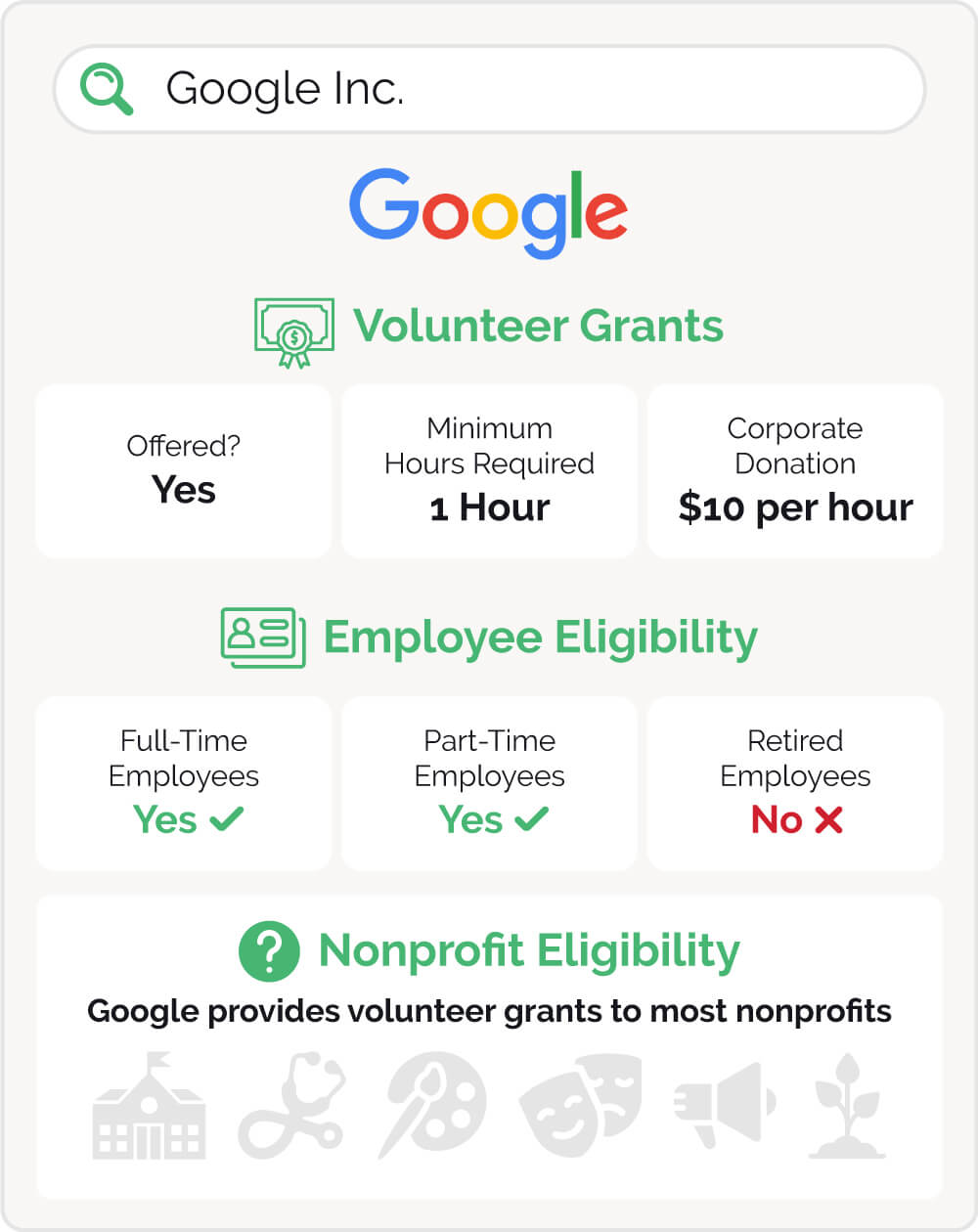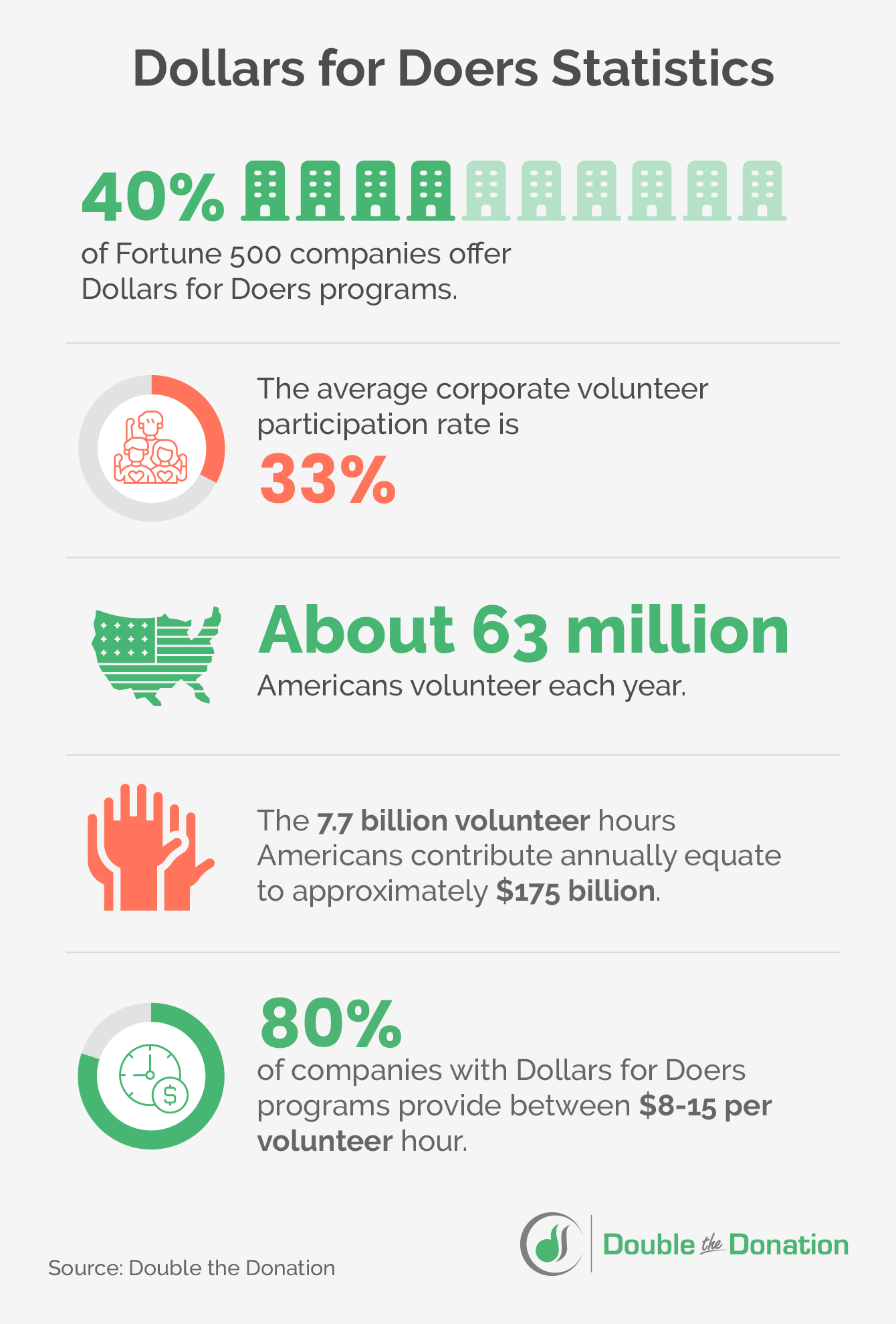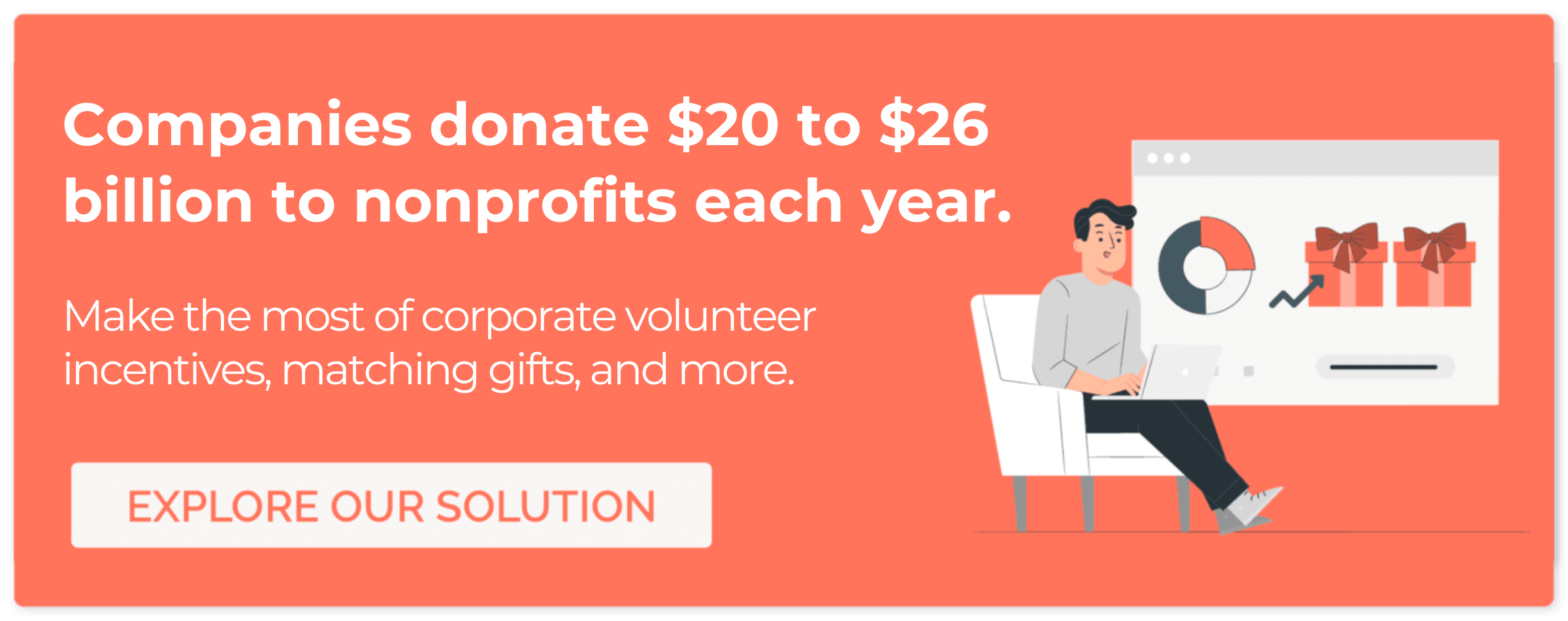Dollars for Doers 101: How to Boost Your Volunteers’ Impact
Around 63 million Americans volunteer, making up one-third of the nonprofit workforce. Chances are, your nonprofit relies on volunteers who work hard to fulfill your mission. The value they provide is already incalculable, but what if there was a way for them to take their impact even further at no additional cost? Dollars for Doers grant programs can help your volunteers amplify their impact even more!
Dollars for Doers grants can substantially boost your fundraising revenue and grow volunteer engagement. To tap into these corporate volunteer programs, your organization needs to understand the basics, and we’re here to help.
In this article, we’ll break down the definition of Dollars for Doers grants and guide you through effective strategies for raising more. Specifically, we’ll cover:
- What are Dollars for Doers Grants?
- How Dollars for Doers Programs Work
- The Impact of Volunteer Grant Programs
- Top Dollars for Doers Companies
- How to Get Dollars for Doers Grants
From educating volunteers to discovering necessary tools to invest in, you’ll know exactly how to find and take advantage of these programs. Let’s first start with a basic definition.
What are Dollars for Doers Grants?
A Dollars for Doers program is a corporate giving program in which companies provide monetary donations to nonprofit organizations based on the volunteer hours contributed by their employees. When employees volunteer their time to eligible nonprofits, the company matches this volunteer effort with a financial grant to the organization, thereby enhancing the impact of the employee’s volunteer work.
Dollars for Doers grants are also frequently referred to by other names, such as:
- Volunteer Grants
- Matching Time Programs
- Dollar-for-Hour Programs
- Grants for Time Programs
- Community Service Grants
- Volunteer Match Programs
These programs encourage corporate philanthropy, increase employee engagement, and provide valuable financial resources to nonprofits.
However, Dollars for Doers programs are often overlooked due to a lack of awareness by both nonprofits and volunteers. Nonprofits don’t always know whether their volunteers work for companies that offer these grants, and volunteers are often unaware their companies even offer such a program.
How Dollars for Doers Programs Work
While every company has its own participation requirements, all volunteer grant programs generally follow the same blueprint. So that your nonprofit can fold these grants into its volunteer management approach, here’s how they work:
- An individual volunteers with a nonprofit. Dollars for Doers programs require employees to initiate by volunteering like normal. At this stage, eligible supporters volunteer like any other member of your team.
- The individual submits a request for a Dollars for Doers grant to their employer. To earn funding from a Dollars for Does program, employees need to alert their employer to their volunteer hours, usually by submitting an application through their employers’ CSR software.
- The employer verifies the hours volunteered with the nonprofit. During this stage, some employers may accept employees’ reported volunteer hours without further question, while others might contact you for confirmation. In either case, be prepared by having accurate hour reports.
- The employer sends a check to the nonprofit. If the volunteer’s request is approved, your nonprofit should receive a payment from their employer. This payout may come from the business or a CSR software vendor depending on what technology they use to manage their Dollars for Doers program.
It’s that simple! Share this process with your volunteers, let them know you’re there to help, and meticulously track volunteer hours with your volunteer management tools. In no time, you’ll see the volunteer grants start rolling in.
Common Dollars for Doers Criteria
While most Dollar for Doers programs follow similar processes, each company that offers a Dollars for Doers program has unique requirements and guidelines.
These guidelines typically outline:
- Nonprofit eligibility requirements. Typically, most types of nonprofits, such as arts organizations, health and human services groups, and environmental organizations, will be accepted. The most common types of ineligible nonprofits are political organizations, churches and religious groups, and nonprofits owned by the participating employee or a member of the employee’s family.
- The minimum number of volunteer hours required to be eligible. There are usually two types of minimum-hour requirements. Some volunteer grant companies provide contributions based on a per-hour basis. Others require employees to volunteer for a certain number of hours in exchange for a flat donation.
- Grant amounts per volunteer hour or per threshold passed. Most companies put a cap on the number of volunteer hours or the total amount they will donate per employee per year to keep their budgets in check.
- Employee eligibility requirements. Not every employee who works for a company with a volunteer grant program will be eligible. For instance, some companies may only offer the program to full-time employees who have worked for the business for a certain number of years. In contrast, other organizations may make their program available to part-time employees and retirees.
Here’s an example of a company profile with these criteria:
Dollars for Doers grants depend on a few factors, and it might not be apparent how much of an impact they can make on your nonprofit. In the next section, we’ll outline some eye-opening statistics that demonstrate why your organization should tap into this powerful form of corporate philanthropy.
Types of Dollars for Doers Frameworks
As you start researching different Dollars for Doers companies, you’ll notice a few common frameworks. So that you’re prepared to leverage these opportunities, here are the three approaches you might encounter:
- Grant Based on Service Hours: Companies match volunteer hours with donations to the same nonprofit based on an hourly rate. For example, 20 hours at $10/hour equals a $200 donation. Requirements may include minimum hours, budget caps, and organization eligibility.
- Credit Grant Per Service Hour (to Any Nonprofit): This is similar to the first framework, but employees can direct the grant to any nonprofit. For example, 20 hours at $10/hour equals a $200 credit grant for any eligible nonprofit. This framework supports company-sponsored volunteer events while also recognizing and supporting causes that employees are passionate about.
- Milestone Grant for Volunteer Goal (Can Be Restricted or Open): Employees become eligible for grants after reaching a set number of volunteer hours. For example, an employee becomes eligible for a $250 grant after volunteering a minimum of 20 hours.
Understanding these frameworks will allow your team to better engage with corporate partners and encourage employee participation in volunteer programs. Make sure your team members fully understand these frameworks, so they can help volunteers when the time comes to request a grant!
The Impact of Volunteer Grant Programs
Not convinced that Dollars for Doers programs should be part of your fundraising strategy? Check out these stats that our team at Double the Donation has uncovered:
- 40% of Fortune 500 companies offer Dollars for Doers programs, indicating that a significant portion of influential companies support employee volunteerism.
- The average corporate volunteer rate participation rate is 33%, meaning your nonprofit has a substantial opportunity to engage with active corporate volunteers.
- About 63 million Americans volunteer each year, totaling 7.7 billion hours, which equates to approximately $175 billion annually.
- 80% of companies with Dollars for Doers programs provide between $8-15 per volunteer hour, showing that the majority of Dollars for Doers companies offer generous financial contributions.
Dollars for Doers programs are incredibly impactful because they energize volunteer engagement, drive recruitment, and improve retention by rewarding volunteers for their time. Moreover, they can significantly boost nonprofit revenue and forge stronger, mutually beneficial connections with companies, amplifying your organization’s impact and support network.
These statistics show how common Dollars for Doers programs actually are and how many individuals volunteer annually. Chances are good that at least a few of your volunteers are eligible for a volunteer grant and just need your help in learning about them.
Top Dollars for Doers Companies
Many companies offer generous volunteer grants. For examples of what Dollar for Doers programs look like in action, check out these examples from three top companies:
Overview of This Dollars for Doers Company
Google needs little introduction, but for reference, it’s a multinational technology company specializing in Internet services and products, including a search engine, online advertising, software, hardware, and more.
To cultivate a positive reputation, create a positive work environment, and do good in the world, Google has multiple CSR programs, such as volunteer grants, Google for Nonprofits, and the Google Ad Grant.
Dollars for Doers Grant Information
For every hour of volunteer work a Google employee performs, the company will provide a $10 grant to the nonprofit. The minimum hours requirement is just 1 hour, meaning volunteers start earning for your cause immediately.
Microsoft
Overview of This Dollars for Doers Company
Microsoft is also a major international player in the technology space. It’s a multinational company that develops computer software, consumer electronics, personal computers, and more.
Similar to Google, Microsoft offers a range of CSR initiatives to engage employees, including a Dollars for Doers program.
Dollars for Doers Grant Information
With no minimum amount of hours required for a grant, Microsoft awards $25 per hour to nonprofits where their employees volunteer.
Verizon
Overview of This Dollars for Doers Company
Verizon is the second-largest wireless carrier in the United States, serving more than 144 million customers.
Dollars for Doers Grant Information
Verizon offers a Dollars for Doers program with unique requirements. Employees are required to volunteer for 50 hours to earn a $750 grant for a nonprofit. However, each employee can then volunteer another 50 hours at a different nonprofit to earn $750 for that organization each year. This encourages employees to work with multiple causes.
How to Get Dollars for Doers Grants
Now that you understand the fundamentals, the next step is to determine whether any of your volunteers work for a Dollars for Doers company.
To ensure as many eligible volunteers as possible earn volunteer grants, nonprofits should invest in software. A volunteer management platform is a great start for storing accurate volunteer information!
Then, go one step further and research matching gift and volunteer grant databases. This type of software provides your volunteers with access to an extensive database of corporate giving programs, including matching gifts and Dollars for Doers programs. The database can help volunteers discover guidelines, grant amounts, hour requirements, and more, so they have exactly the information they need.
When it comes to comprehensive, up-to-date, and user-friendly software, we have to recommend our matching gift solution.
Double the Donation
Double the Donation maintains an extensive corporate giving database that contains up-to-date information on corporate giving programs for 99% of United States businesses and 95% of Canadian companies. It’s the ideal solution for all sorts of nonprofits and universities looking to double their matching gift revenue and tap into Dollars for Doers programs.
When supporters donate on your website or sign up to volunteer, Double the Donation can automatically scan the information they provide, such as their email domain or employer details, to determine their eligibility for corporate giving programs. Depending on their eligibility, the platform triggers customizable emails to the supporter detailing the appropriate next steps to submit either a matching gift or Dollars for Doers grant request. Check out this video to see how our solution works:
Our software will alert supporters about their eligibility, follow up to drive requests to completion, and thank supporters for submitting an application to their employer, so you don’t have to. Thanks to 100+ integrations with leading nonprofit software, you can rest assured that you’re finding as many volunteer grant and matching gift opportunities as possible!
Marketing Dollars for Doers Grants
Matching gift software ensures these revenue opportunities don’t slip through the cracks, but it’s still important to promote Dollars for Doers grants to your volunteers. After all, many supporters are likely unfamiliar with volunteer grants and will need your nonprofit to give them that initial push to check their eligibility.
Here are some helpful ways to market Dollars for Doers grants:
- On your website. Create informational content on your website about Dollars for Doers grants. You might include details about these programs on your volunteer information page, add a section to your Ways to Give page about volunteer grants, or create a new page dedicated to corporate giving programs like Dollars for Doers.
- In your email outreach. In your newsletters, spotlight volunteer grants to encourage your subscribers to research their eligibility. Link them to educational content on your website and let them know they can reach out to you if they have any questions.
- On social media. Regularly post information about Dollars for Doers grants, and just like with your email outreach, link to your informational content on your website.
- In direct mail outreach. Include an insert in your direct mail outreach that explains volunteer grants and how volunteers can search for their company’s program guidelines.
- In volunteer thank-you letters. When thanking volunteers for their hard work, let them know they might be able to take their impact further through their employers’ volunteer grants program.
The easiest way to market available opportunities is by using software like Double the Donation to embed an employer search tool into your website and volunteer registration forms. By directing your supporters to it across your outreach, they’ll be able to find their employers’ Dollars for Doers program information and successfully submit grant requests. Essentially, the easier it is to submit an application, the more supporters will do it, and Double the Donation can make the process as streamlined as possible.
Additional Dollars for Doers Resources
Dollars for Doers programs are underutilized funding resources. Set your nonprofit up to secure the grants your volunteers have earned with proper hours recording policies, a volunteer grant education campaign, and the right corporate giving database.
To learn more about volunteer grants and how they impact the social good sector, explore these resources:
- Maximizing Impact With Corporate Volunteer Grant Programs. Our essential guide breaks down even more of the basics of Dollars for Doers programs. Explore it to learn even more about these valuable grant opportunities.
- Top 10 Volunteer Grant Companies: Increase Corporate Dollars. This list will help you find out if any of your volunteers are linked to top Dollars for Doers companies.
- Top 50+ Popular Companies That Donate to Nonprofits. Explore several leading companies that give back to nonprofits via matching gifts, volunteer grants, and other philanthropic programs.
